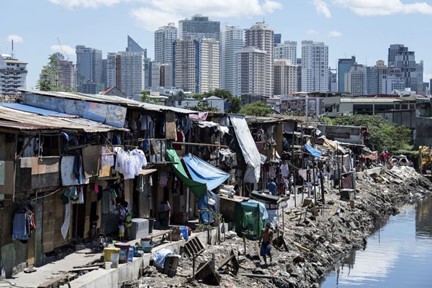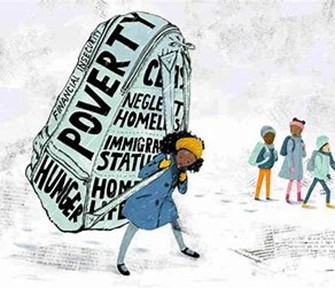I am musing over poverty, poverty beyond the traditional definition of a state or condition in which a person or community lacks the financial resources and essentials for a minimum standard of living. I am reflecting on poverty in human societies encompassing material, character, mental, social, intellectual, and ideological dimensions. We should not think of poverty in material terms only, but I am not going to muse over mental or ideological poverty. Those may be for another day.

Material poverty refers to the lack of basic resources necessary for a decent standard of living. It includes insufficient access to food, clean water, shelter, healthcare, and education. These are universal basic human needs. They determine quality of life and often involve discussions about economic inequality, social safety nets, and the distribution of wealth. Material poverty at a societal level raises questions about social justice, fairness, and the role of government in addressing economic disparities.
I look at poverty of character as lack of “good” societal acceptable manners and behaviour, what we call obuntubulamu in Luganda. In my musing I take poverty of character as being embodied in individual characteristics. To me, reflecting on poverty of character involves discussing the balance between personal responsibility and societal expectations.
What constitutes “good” or “acceptable” manners and behaviour depends on cultures and is influenced by social media and changes over time. I am, therefore, conscious of passing judgement on one’s lack of manners without reference to the cultural context.
Social norms and manners are not static, they change over time in response to shifts in values and intermingling of people of different ethnicities and cultures. Different generations often have different views on manners and social behaviour. At four score plus, I may lament the perceived decline in traditional etiquette, while younger generations may view these changes as adaptations to contemporary lifestyles. There are, though, inalienable human good behaviours which, if missing in a person, I categorize that person as being poor of manners. These include acknowledgement of the universal rights that all people are entitled to, regardless of nationality, gender, national or ethnic origin, colour, religion, language, or any other status, ranging from the most fundamental – the right to life – to those that make life worth living, such as the rights to food, education, work, health, and liberty. At a personal level respecting people’s private spaces and yet living in communities mindful of the interhuman connectivity, in other words not living as a human island.
Reflecting on the decline in manners prompts musing over the role of education and the influence of role models in shaping behaviour. Other than homes, schools are a major character-building ground. When teachers lack good and acceptable manners and civility, society faces a rickety ladder to climb to development. There are regular stories of teachers molesting pupils, teachers “stealing” examination papers for their pupils in pursuit of good school performance record, misappropriation of school funds etc. We see outrageous demands on parents and guardians to provide unrealistic scholastic and building material every term that, most likely, end up into teachers’ shops. Such teachers, however few, cannot be expected to be good role models for the development of a society rich in social behaviour.
 Musing over apparent lack of proper communication must consider technology’s influence. The rise of digital communication and social media is transforming the way people communicate. Digital interactions are altering the norms of politeness, such as the use of emojis or abbreviations, as well as the potential for anonymity and uncivil behaviour online. While embracing technological advancements, we need to jealously protect our need to “communicate”. I define communication as the exchange of mutually understandable messages that can be responded to. If I use an emoji or an abbreviation it should unambiguously convey the message it is intended to convey. Having a conversation with a person hiding behind anonymity is a futile exercise in communication. A person who cannot be understood or willing to own what he/she is saying has, what I refer to as, interaction poverty.
Musing over apparent lack of proper communication must consider technology’s influence. The rise of digital communication and social media is transforming the way people communicate. Digital interactions are altering the norms of politeness, such as the use of emojis or abbreviations, as well as the potential for anonymity and uncivil behaviour online. While embracing technological advancements, we need to jealously protect our need to “communicate”. I define communication as the exchange of mutually understandable messages that can be responded to. If I use an emoji or an abbreviation it should unambiguously convey the message it is intended to convey. Having a conversation with a person hiding behind anonymity is a futile exercise in communication. A person who cannot be understood or willing to own what he/she is saying has, what I refer to as, interaction poverty.
Intellectual poverty refers to a condition in which individuals or communities lack access to education, information, and the intellectual resources necessary for cognitive development and critical thinking. It goes beyond the absence of material resources and encompasses the limitations on mental and cognitive growth. As I muse over intellectual poverty, I think of various factors that contribute to this condition and its impact to society.
A society led by people who are intellectually poor cannot expect to improve its educational systems, promote access to information, address cultural and linguistic barriers, and foster a culture that values intellectual pursuits. Intellectually poor leaders are a hindrance to working towards comprehensive solutions that empower individuals and communities intellectually.
Lack of what would normally be acceptable political behaviour by so called leaders influencing societal behaviour is what I am musing over as mental political poverty. These are the people who would have been political role models but turn up to be thieves of public resources or enemies of the public. People who seek political positions for financial benefit rather than for contributing to the betterment of the country. A country unfortunate to have such a park of leaders is bound to degenerate in poverty of human rights and inter-personal relations.
Indicators of a country’s prosperity (glass half full) can miss the true picture of the people’s living situation. The population’s broad spectrum of poverty, not simply material poverty. For example, gross domestic product (GDP), a standard and “acceptable” indicator, is the monetary value of all the final goods and services produced and sold within a country’s borders in a specific time period. It is used to estimate the size and growth rate of a country’s economy and to compare it with other countries. As an ordinary citizen struggling to survive on USD 1.5 per day, telling me that I am well off because the country is almost in the middle (albeit low) income category as per its GDP is cold comfort. GDP does not account for the distribution of income among the population. It does not account for or represent the degree of income inequality, poverty, in society. A country with high GDP may still have a large percentage of its population living in poverty. You do not have to look far to see what I am talking about.

The country can fight these aspects of poverty if it nurtures its young in the knowledge of what is right and what is wrong not only when in public view but also when alone behind closed doors. Do the top leaders have the courage to force the existing poverty riddled society to change to be able to bring up the young people in culturally enriched society? That is the billion-Shilling question.
Let the promotion of universal prosperity, bonna bagaggawale, not focus on material enrichment only but cover behavioural, intellectual, educational and all other essential aspects of human life. Let the enrichment be towards uplifting oneself to a better healthy lifestyle and environment.
I have found musing over poverty (meaning a lack [of]) of good manners or acceptable societal behaviour is a valuable exercise in understanding the dynamics of social change, cultural diversity, and the impact of technology on human interactions. It can also serve as a starting point for conversations about education, and the role of individuals, leaders, and institutions in promoting a more civil and respectful society.
Thank you for being part of the Fork in the Road Blogs: Reflections on Life. Be sure to look out for the next episode when I will be writing about Leadership. If you gathered something useful, please feel free to share the blog. My books, Fork in the Road: Creating a future of value starting from where you are and A view round the bend. Setting goals for your life’s journey are available for purchase at Aristoc bookshops in Kampala, Uganda and online at Amazon.
Your comments on my musings are most welcome and let me know whether there is a topic you would like me to muse over.


Comments (2)
Jakob Ssendawula
Thank you Mw. Lwanga for your insightful reflection as always. Something came to mind as I read through: perhaps the best way to fully eradicate the poverty described in all it’s forms is if we focus on collective growth as opposed to individual success. However, given the current trend that advocates broadly for individualism, won’t it be close to impossible to achieve?
JS
Rtn Stephen
You said it correctly and posed the right question. Think about it.